Levamisole is an imidazothiazole anthelmintic that is very effective against nematode parasites.
 |
Nematodes are among the most common parasites diagnosed in reptiles, with more than five hundred reptile forms identified. Larval forms migrate through the body. Adult nematodes are typically thought of as worms. Because of their ubiquitous nature, several drugs have been adapted to treat them.
Levamisole is an imidazothiazole anthelmintic that is very effective against nematode parasites. It has become popular because it can be administered by injection subcutaneously and is equally effective against nematodes in the lungs as well as in the GI tract.
Levamisole works by interfering with nematode carbohydrate metabolism by blocking fumarate reductase and succinate oxidase activity, important metabolic enzymes, with a net effect of paralyzing the worm(s), which are often expelled alive. Although the drug can be administered by injection—making it popular for use in shy chelonians—it has a very narrow range of safety. It is safer when given orally. Levamisole is dosed at 5–10 mg/kg PO or SC, and repeated once in two weeks.
Levamisole has a nicotine-like effect on both the parasite and the host. Toxicity is manifested much like organophosphate poisoning: salivation, muscle tremors, head shaking, and excitability. Death is generally due to respiratory distress and eventual respiratory paralysis. Because of these side effects, levamisole is contraindicated for debilitated reptiles and for those with renal (kidney) or hepatic (liver) impairment.
Excerpt from the book Understanding Reptile Parasites by Roger Klingenberg with permission from its publisher, Advanced Vivarium Systems, an imprint of BowTie Press. Purchase Understanding Reptile Parasites here.



